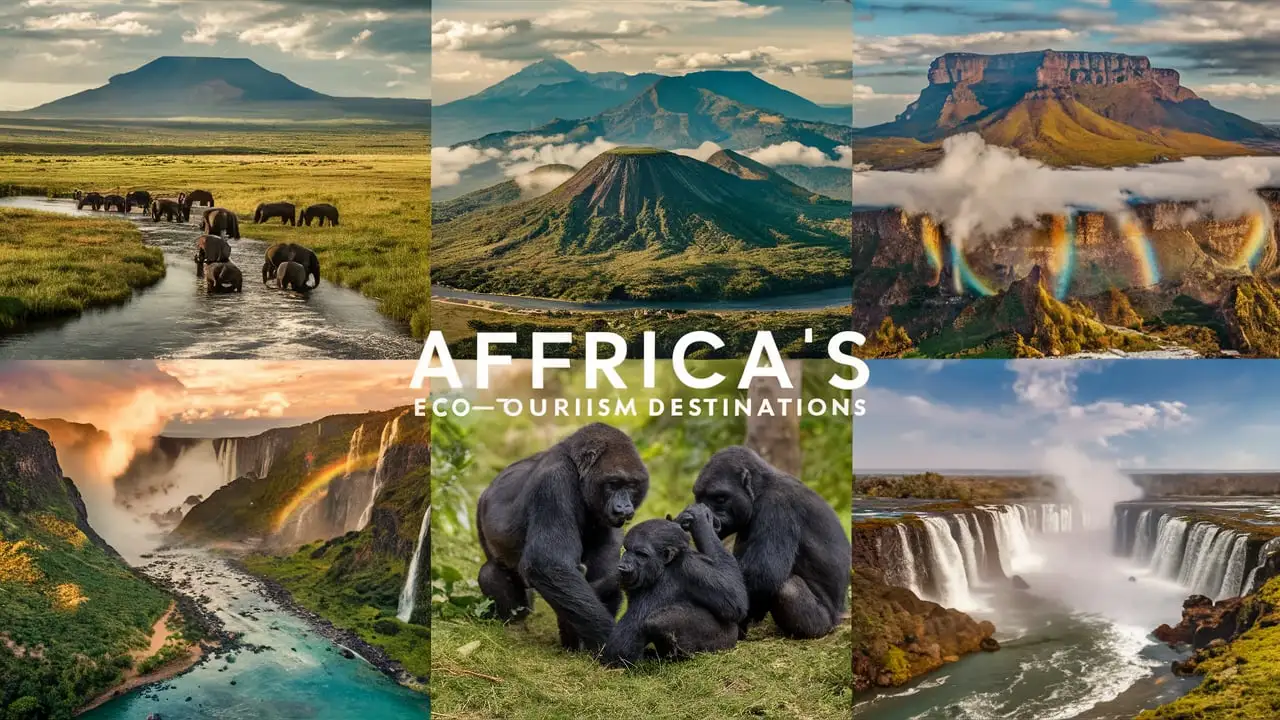Eco-Tourism Adventures in Africa: Sustainable Wildlife Travel and Cultural Immersion
Eco-tourism has gained significant popularity as travelers increasingly seek ways to explore the world while minimizing their impact on the environment and supporting local communities. In the context of Africa, the continent’s vast and diverse landscapes offer unique opportunities for eco-conscious travelers to engage in sustainable wildlife experiences and immerse themselves in rich cultural traditions. This introduction sets the stage for exploring how overseas adventure travel in Africa can align with eco-tourism principles.

Content
Understanding Eco-Tourism
Eco-tourism is a form of tourism that emphasizes responsible travel practices aimed at conserving the environment, preserving cultural heritage, and benefiting local communities economically. Key principles include minimizing environmental impact, supporting conservation efforts, respecting local cultures, and providing positive experiences for both tourists and hosts. By understanding these principles, travelers can make informed choices that contribute positively to the places they visit.
Top Eco-Tourism Destinations in Africa
Serengeti National Park, Tanzania
The Serengeti is renowned for its annual wildebeest migration, one of the most spectacular wildlife events on Earth. Eco-tourism here focuses on sustainable safari practices that prioritize wildlife conservation and habitat preservation. Travelers can witness this natural phenomenon while supporting efforts to maintain the Serengeti’s ecological balance.
Okavango Delta, Botswana
As a UNESCO World Heritage Site, the Okavango Delta is a pristine wilderness that sustains a diverse array of wildlife and plant species. Eco-friendly lodges and guided canoe safaris allow visitors to explore this unique ecosystem without leaving a significant environmental footprint. These experiences also contribute to local conservation efforts and community development initiatives.
Bwindi Impenetrable Forest, Uganda
Home to nearly half of the world’s endangered mountain gorillas, Bwindi offers eco-conscious travelers the opportunity to participate in gorilla trekking tours. These tours are carefully managed to minimize disturbance to the gorillas and their habitat, ensuring sustainable tourism practices that benefit both conservation and local communities.
Maasai Mara, Kenya
The Maasai Mara is famous for its abundance of wildlife, including the Big Five (lion, leopard, elephant, buffalo, rhinoceros). Eco-tourism initiatives here support Maasai communities by offering culturally immersive experiences such as visits to traditional villages and opportunities to learn about Maasai customs and traditions. Travelers can also participate in wildlife conservation efforts through responsible safari tours.
Namib Desert, Namibia
The Namib Desert, one of the oldest deserts in the world, showcases unique desert-adapted wildlife and stunning landscapes. Eco-tourism activities in the Namib focus on educating visitors about desert conservation and sustainable living practices. Guided tours offer insights into the desert’s flora and fauna while promoting respect for this fragile ecosystem.

Sustainable Wildlife Travel
Sustainable wildlife travel is a cornerstone of eco-tourism in Africa, aiming to protect endangered species, preserve natural habitats, and promote ethical wildlife encounters. Travelers can contribute to conservation efforts by choosing eco-friendly safari operators that adhere to strict guidelines on wildlife protection and habitat conservation. Responsible wildlife experiences include game drives that prioritize animal welfare, walking safaris that minimize environmental impact, and visits to sanctuaries dedicated to animal rehabilitation and conservation education.
Cultural Immersion through Eco-Tourism
Cultural immersion through ecotourism allows travelers to connect deeply with Africa’s diverse cultures, traditions, and communities. It emphasizes respectful engagement with local customs and traditions, supporting cultural preservation efforts, and fostering meaningful exchanges between tourists and hosts. Cultural tours may involve visits to indigenous communities, participation in traditional ceremonies and festivals, and opportunities to learn about local crafts, music, and cuisine. By engaging in these experiences, travelers gain a deeper appreciation for Africa’s rich cultural heritage while promoting cultural sustainability and economic empowerment within local communities.
Eco-Friendly Accommodations
Choosing eco-friendly accommodations is essential for practicing sustainable tourism in Africa. Eco-lodges, tented camps, and community-run guesthouses are designed to minimize environmental impact through practices such as using renewable energy sources, implementing water conservation measures, and supporting local conservation initiatives. These accommodations provide comfortable and immersive stays that align with eco-tourism principles while offering opportunities for travelers to learn about environmental sustainability and community development.
Practical Tips for Eco-Conscious Travelers
To enhance their eco-friendly travel experience in Africa, travelers can adopt practical tips that reduce their environmental footprint and support sustainable tourism practices. These tips include minimizing carbon emissions by using public transportation or offsetting travel emissions, packing eco-friendly travel gear such as reusable water bottles and biodegradable toiletries, supporting local businesses and artisans through responsible purchasing practices, and participating in volunteer opportunities that contribute to conservation and community development projects.
Conclusion
Eco-tourism in Africa offers travelers a unique and rewarding way to explore the continent’s natural wonders and cultural treasures while promoting environmental conservation and supporting local communities. By embracing sustainable wildlife travel and cultural immersion experiences, tourists can contribute to the preservation of Africa’s biodiversity and cultural heritage, ensuring that these resources are enjoyed by future generations.












